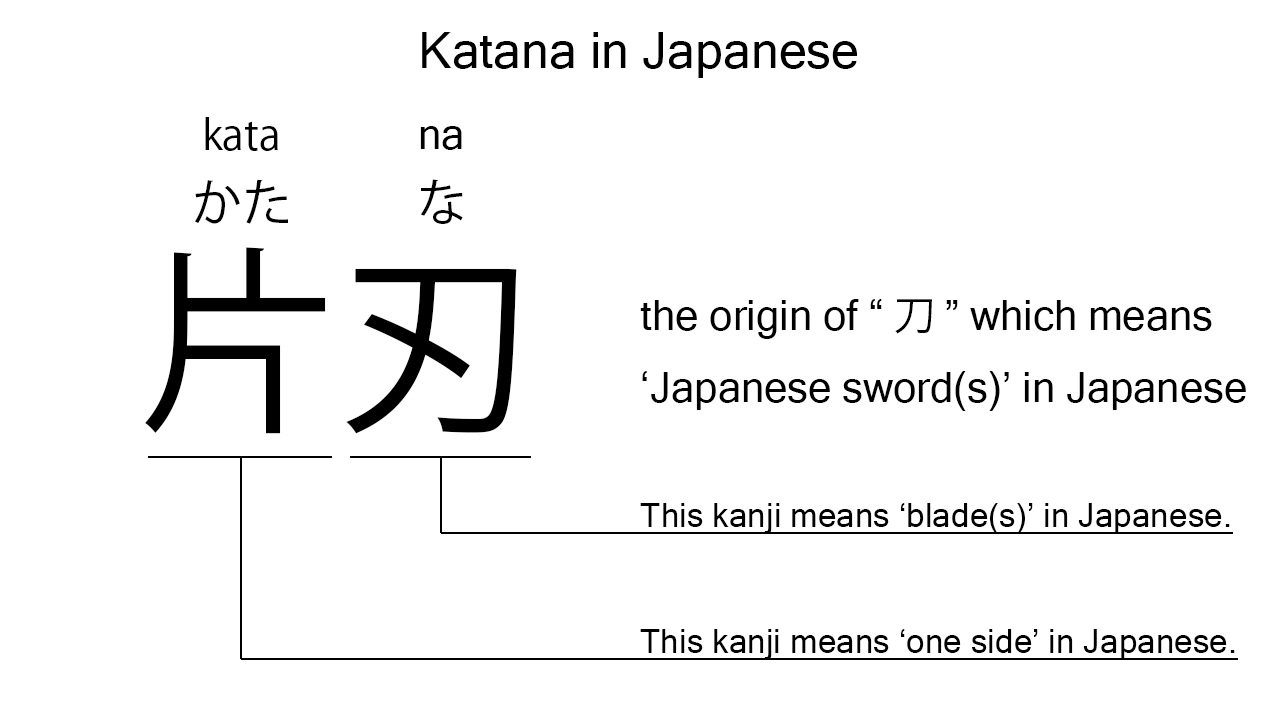What does “katana” mean in Japanese?
Native speakers use katana to mean a ‘sword’ or specifically a ‘Japanese sword’ in Japanese. Probably, some Japanese learners know this word as it is sometimes used in Japanese movies, novels, manga, anime, and the like. In this blog post, however, I’m explaining this word in detail together with its kanji expressions. And also, I’m explaining how to use it through example sentences. My explanations would help Japanese learners understand katana more clearly. Then, let’s get started!
Contents
Definition and meanings of “katana”
Let me start with the definition and meanings of katana.
- katana – 刀 (かたな) : a noun meaning a ‘sword’ or specifically a ‘Japanese sword’ in Japanese. This can also work as plural. Learn more about Japanese plural.
Native speakers use this noun to refer to swords in Japanese. In many cases, it specifically refers to Japanese traditional ones which are single edged and slightly curved.
The definition and meanings are simple and clear. To understand this noun more clearly, however, let me explain its original kanji expression in detail.
Katana in kanji
It is said that the original kanji expression of katana was 片刃. This consists of the following two kanji characters:
- 片 : a kanji character often used as a prefix to add the meaning of ‘one side’ in Japanese.
- 刃 : a kanji character used to mean a ‘blade’ in Japanese
From these two kanji characters, we can understand that katana literally meant ‘one side blade’ in the old Japanese language. This literal interpretation is not completely in line with the actual meanings, but still understandable, I think. Japanese traditional swords are often single edged.

When we meet new kanji expressions, we should check their characters in detail to understand their meanings clearly and deeply. In many cases, kanji characters tell us a lot about the meanings of the expressions they form. Actually, here, we could get the better understanding of katana through the detailed check above.
So far, I’ve explained the definition and meanings of katana together with its kanji expressions. Then, let me explain how to use it through the example sentences below.
How to say “sword” in Japanese
kono katana wa totemo utsukushii desu – この刀はとても美しいです (このかたなはとてもうつくしいです)
This sword is very beautiful.
Below are the new words used in the example sentence.
- kono – この : a determiner used before a noun which refers to something close to the speaker. In the example, this is used before katana to mean ‘this sword’ in Japanese.
- wa – は : a binding particle working as a case marker or topic marker. In the example, this works after kono katana to make the subject in the sentence.
- totemo – とても : an adverb of degree meaning ‘very’, ‘much’, ‘so’, or such in Japanese. In the example, this works in front of utsukushii to emphasize its meaning.
- utsukushii – 美しい (うつくしい) : an i-adjective meaning ‘beautiful’ in Japanese.
- desu – です : an auxiliary verb used after a noun or adjective to make it polite. Probably, this is well known as a part of Japanese desu form. In the example, this is used after utsukushii to make it sound polite.
This is a typical usage of katana. In this example, it works together with kono to mean ‘this sword’ in Japanese. When we want to refer to swords in Japanese, anyway, this noun is a very good option.
Another example of “katana”
watashi wa furui katana ga suki desu – 私は古い刀が好きです (わたしはふるいかたながすきです)
I love old Japanese swords.
Below are the new words used in the example sentence.
- watashi – 私 (わたし) : a pronoun meaning ‘I’ in Japanese.
- furui – 古い (ふるい) : an i-adjective meaning ‘old’ in Japanese.
- ga – が : a case particle used to make the subject word or the object word in a sentence. In the example, this is used after furui katana to make the object in the sentence.
- suki – 好き (すき) : the stem part of the na-adjective, sukina, which means ‘favorite’ in Japanese. Native speakers, however, often use this as an individual word to mean ‘to like’ or ‘to love’ in Japanese. In the example, this is used to mean ‘to love’ in Japanese.
This is another example of katana. In this example, it works together with the i-adjective, furui, to mean ‘old Japanese swords’ in Japanese.
Summary
In this blog post, I’ve explained the definition and meanings of katana in detail together with its kanji expressions. And also, I’ve explained how to use it through the example sentences. Let me summarize them as follows.
- katana – 刀 (かたな) : a noun meaning a ‘sword’ or specifically a ‘Japanese sword’ in Japanese. This can also work as plural. It is said that the original kanji expression of this noun was 片刃. These two kanji characters literally mean ‘one side blade’ in Japanese. This literal interpretation is not completely in line with the actual meanings, but still understandable, I think. Japanese traditional swords are often single edged.
Hope my explanations are understandable and helpful for Japanese learners.
Leave a Reply